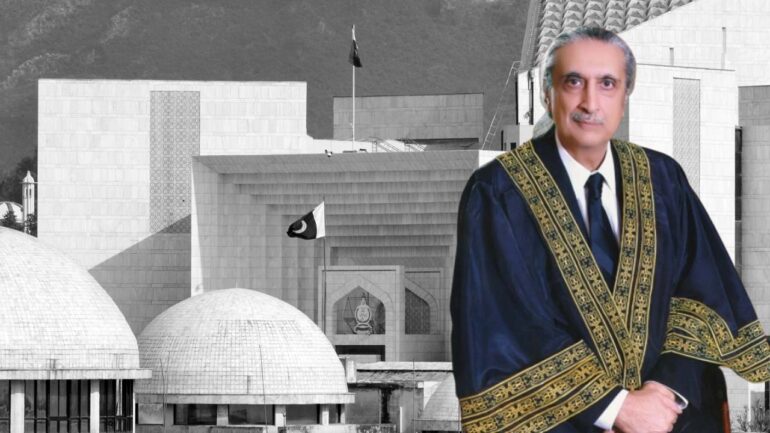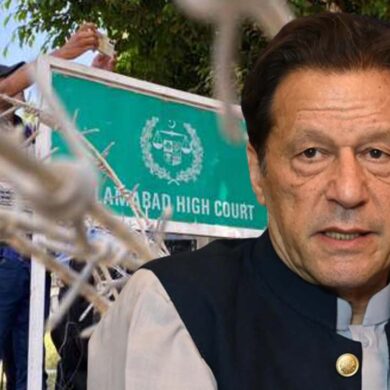The divide in Supreme Court exposed once again on Thursday when a nine-member bench, hearing a set of petitions challenging the trial of civilians in military courts, was relegated to seven members after designated Chief Justice of Pakistan Justice Qazi Faez Isa refused to take part in proceeding until resolution of the SC (Practice and Procedure) Bill 2023.
Consequently, Chief Justice of Pakistan Umar Ata Bandial proceeded with a fresh seven-member bench, excluding justices Isa and Masood to hear the petitions were filed by various individuals, including former CJP Jawwad S. Khawaja, Aitzaz Ahsan, Karamat Ali, and PTI Chairman Imran Khan.
Khawaja requested the court to declare the trial of civilians by military courts as unconstitutional, specifically targeting Section 2(1)(d)(i) and (ii) of the Pakistan Army Act.
As an interim measure, Khawaja sought to suspend proceedings against civilians based on these sections.
Ahsan, a former law minister and prominent figure in the 2007 lawyers’ movement, aimed to prevent the trial of any civilians in military courts who were allegedly involved in the May 9 violence. He clarified that his petition did not intend to obstruct the trial of civilians in duly established criminal courts.
Imran Khan’s petition sought a declaration against the arrests, investigation, and trial of civilians under the Pakistan Army Act (PAA) 1952 and the Official Secrets Act 1923.
During the hearing, the court focused on the issue of military courts.
Justice Syed Mansoor Ali Shah invited objections from anyone regarding the seven-member bench, to which Ahsan and the Attorney General of Pakistan stated they had no objections.
The court emphasized its focus on military courts and refrained from discussing political aspects raised in Imran Khan’s petition.
Ahsan’s lawyer, Latif Khosa, argued that the trials of civilians in military courts had indeed commenced, citing the Formation Commanders’ Conference and the National Security Committee endorsement.
The court requested Khosa to provide evidence that trials had begun and inquired about the number of cases sent to military courts.
Khosa revealed that around 4,000 people were arrested across the country on May 10, including PTI members Shah Mahmood Qureshi, Murad Saeed, and Hammad Azhar.
Justice Shah questioned the permission given by anti-terrorism courts to transfer cases to military courts and whether affected individuals had approached the Supreme Court.
Justice Afridi raised concerns about the completeness of the documents submitted with Ahsan’s plea.
The court also raised inquiries about the laws governing military courts, the names of individuals sent for trial, and the role of anti-terrorism courts. Khosa affirmed that civilians have the right to approach high courts for fundamental rights and highlighted that trials should be held in anti-terrorism courts, not military courts.
CJP Bandial expressed concern over the harassment of lawyers and emphasized the accused’s right to legal representation, regardless of the court. The court demanded details of individuals in civilian and military custody and sought the record of all arrests made since May 9.
The hearing was adjourned until the following day, with arguments from Faisal Siddiqi representing Karamat Ali to be heard.
Earlier, the government formed a judicial commission headed by Justice Isa to probe audio leaks of high-profiles which was followed by stay from the SC on its further proceeding.



